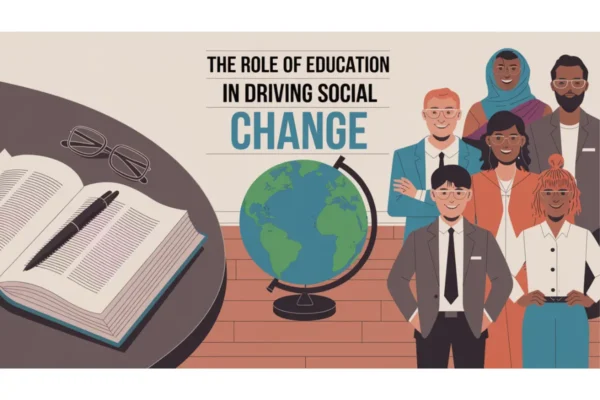
The Role of Education in Driving Social Change
Introduction: Education as a Catalyst for Change Education is one of the most powerful tools for driving social transformation. By empowering individuals with knowledge, skills, and critical thinking abilities, education can break the cycle of poverty, promote equality, and address pressing global challenges. In this post, we’ll examine how education contributes to social change and explore strategies to maximize its impact. 1. Empowering Individuals Through Knowledge Education provides individuals with the skills and knowledge needed to improve their lives and contribute to society. Key Benefits of Education: Stat Check: According to UNESCO, every additional year of schooling increases an individual’s income by an average of 10%. 2. Promoting Equality and Reducing Disparities Education is a powerful equalizer, bridging gaps in opportunity and promoting social equity. Gender Equality: Reducing Income Inequality: 3. Addressing Global Challenges Education equips societies to tackle some of the world’s most pressing issues: Climate Change Awareness: Public Health: Conflict Resolution: 4. Education and Technological Advancement In an increasingly digital world, education plays a pivotal role in preparing individuals for technological progress. Digital Literacy: Bridging the Digital Divide: 5. Challenges in Achieving Universal Education Despite its transformative potential, education faces several barriers: 1. Lack of Access:Over 258 million children and youth worldwide are out of school, according to UNESCO. Rural and conflict-affected areas are disproportionately impacted. 2. Quality of Education:A focus on rote learning rather than critical thinking and problem-solving skills limits the effectiveness of education. 3. Financial Constraints:Families in low-income countries often struggle to afford tuition, uniforms, and supplies. Further Reading: Explore UNICEF’s report on barriers to education. 6. Strategies for Maximizing Education’s Impact To harness education’s full potential, it’s essential to address these challenges through targeted strategies: Invest in Teacher Training:Skilled teachers are the backbone of quality education. Providing ongoing training and resources is crucial. Embrace Inclusive Education:Designing curricula that accommodate diverse learning needs ensures that no one is left behind. Leverage Technology:E-learning platforms like Coursera and Khan Academy make education accessible to remote areas. Support Community Engagement:Involving parents, local leaders, and community organizations enhances the impact of educational initiatives. 7. Inspiring Stories of Change Through Education Real-life examples highlight how education can drive social transformation: Conclusion Education is a cornerstone of social change, empowering individuals, reducing inequalities, and addressing global challenges. By investing in education and ensuring its accessibility and quality, we can create a more equitable and sustainable future for all. Together, we can harness the transformative power of education to drive meaningful change.









